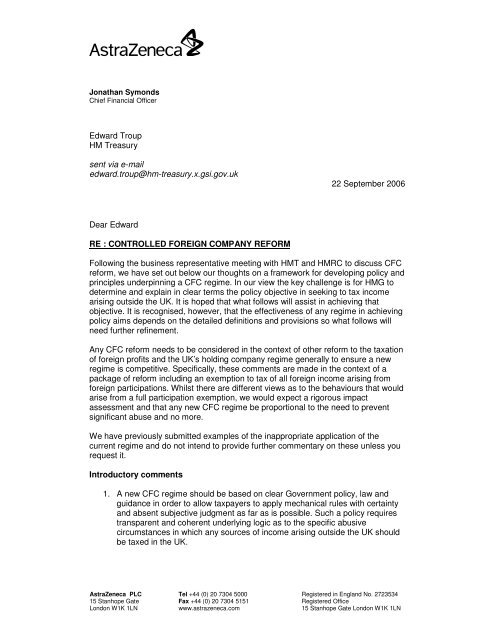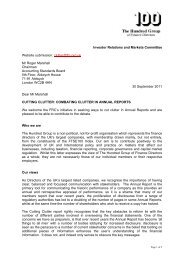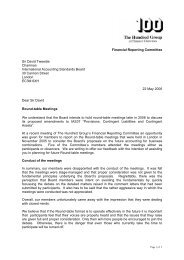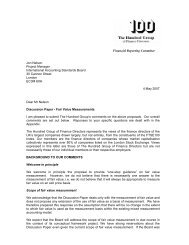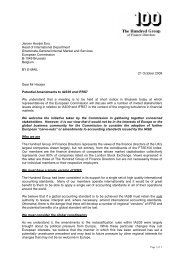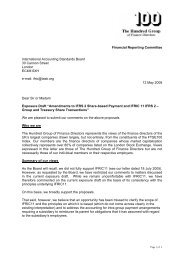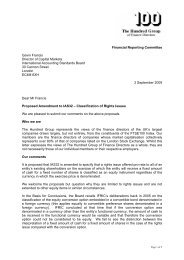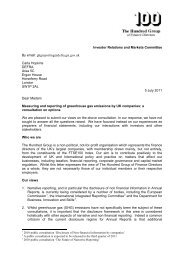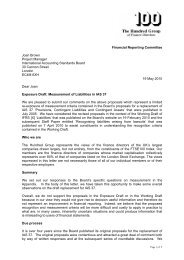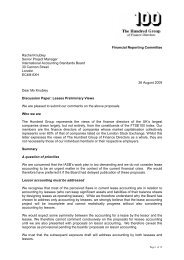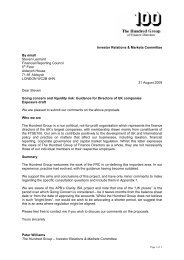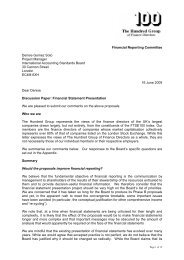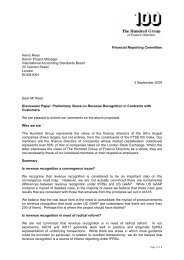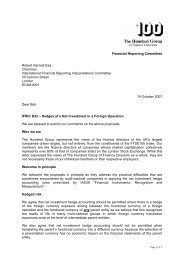Edward Troup HM Treasury sent via e-mail edward.troup@hm ...
Edward Troup HM Treasury sent via e-mail edward.troup@hm ...
Edward Troup HM Treasury sent via e-mail edward.troup@hm ...
Create successful ePaper yourself
Turn your PDF publications into a flip-book with our unique Google optimized e-Paper software.
Jonathan Symonds<br />
Chief Financial Officer<br />
<strong>Edward</strong> <strong>Troup</strong><br />
<strong>HM</strong> <strong>Treasury</strong><br />
<strong>sent</strong> <strong>via</strong> e-<strong>mail</strong><br />
<strong>edward</strong>.<strong>troup@hm</strong>-treasury.x.gsi.gov.uk<br />
Dear <strong>Edward</strong><br />
RE : CONTROLLED FOREIGN COMPANY REFORM<br />
22 September 2006<br />
Following the business repre<strong>sent</strong>ative meeting with <strong>HM</strong>T and <strong>HM</strong>RC to discuss CFC<br />
reform, we have set out below our thoughts on a framework for developing policy and<br />
principles underpinning a CFC regime. In our view the key challenge is for <strong>HM</strong>G to<br />
determine and explain in clear terms the policy objective in seeking to tax income<br />
arising outside the UK. It is hoped that what follows will assist in achieving that<br />
objective. It is recognised, however, that the effectiveness of any regime in achieving<br />
policy aims depends on the detailed definitions and provisions so what follows will<br />
need further refinement.<br />
Any CFC reform needs to be considered in the context of other reform to the taxation<br />
of foreign profits and the UK’s holding company regime generally to ensure a new<br />
regime is competitive. Specifically, these comments are made in the context of a<br />
package of reform including an exemption to tax of all foreign income arising from<br />
foreign participations. Whilst there are different views as to the behaviours that would<br />
arise from a full participation exemption, we would expect a rigorous impact<br />
assessment and that any new CFC regime be proportional to the need to prevent<br />
significant abuse and no more.<br />
We have previously submitted examples of the inappropriate application of the<br />
current regime and do not intend to provide further commentary on these unless you<br />
request it.<br />
Introductory comments<br />
1. A new CFC regime should be based on clear Government policy, law and<br />
guidance in order to allow taxpayers to apply mechanical rules with certainty<br />
and ab<strong>sent</strong> subjective judgment as far as is possible. Such a policy requires<br />
transparent and coherent underlying logic as to the specific abusive<br />
circumstances in which any sources of income arising outside the UK should<br />
be taxed in the UK.<br />
AstraZeneca PLC Tel +44 (0) 20 7304 5000 Registered in England No. 2723534<br />
15 Stanhope Gate Fax +44 (0) 20 7304 5151 Registered Office<br />
London W1K 1LN www.astrazeneca.com 15 Stanhope Gate London W1K 1LN
<strong>Edward</strong> <strong>Troup</strong> Page 2 22 September 2006<br />
<strong>HM</strong> <strong>Treasury</strong><br />
2. The regime should be internationally competitive and should not discourage<br />
commercial investment from the UK in overseas territories.<br />
3. A new regime should apply on a worldwide basis without distinction between<br />
EU member states and non-members.<br />
4. As previously recommended any new regime needs to focus on sources of<br />
income in circumstances of abuse rather then entities. In the examples<br />
previously submitted, the current entity based system is less effective both in<br />
terms of failing to tax certain sources of income within entities and taxing<br />
entities which should fall outside any reasonable regime. The current regime<br />
also restricts repatriation of overseas income through inappropriate<br />
application to intermediate holding companies.<br />
5. A regime focussed on specific income in cases of abuse not only provides a<br />
better framework within which to apply a clear policy but also allows a clean<br />
break from the previous regime.<br />
Framework for developing CFC policy<br />
6. The policy is currently unclear and confusing, which is not surprising, as it has<br />
evolved over some 22 years. In its place there should instead be a set of<br />
principles, which defines targeted offshore income, and explains clearly the<br />
policy under which the <strong>HM</strong>G considers the income should be taxed in the UK.<br />
7. In determining policy, the following needs to be considered:<br />
a. What is the purpose of a CFC regime? Is it to support capital export<br />
neutrality or to encourage holding company location in the UK?<br />
b. Should the UK have the de facto right to tax worldwide income not<br />
subject to a certain level of tax simply due to the UK domicile of the<br />
ultimate parent?<br />
c. Should certain types of income / business activity be targeted?<br />
d. Is the underlying source of income relevant – UK or overseas?<br />
e. Should income be traced to a business activity?<br />
f. Should income arising offshore be targeted (i) at all; (ii) automatically;<br />
or (iii) only where there is a UK related expense?<br />
g. Whether policy is better implemented by denying tax relief for UK<br />
expenses related to generating targeted CFC income as an alternative<br />
to taxing offshore income?<br />
h. What is the rationale for taxing offshore services provided by<br />
substantial operations?<br />
i. In the context of clear policy on targeted income, is a motive test<br />
relevant; and if so how should it apply to determine whether income<br />
should have been taxed in the UK?<br />
j. It needs to be demonstrated that other measures available to <strong>HM</strong>RC<br />
including PE, residence and transfer pricing are not sufficient to<br />
provide necessary protection to the <strong>Treasury</strong> e.g. in relation to<br />
offshore service providers?<br />
k. What is competitive in developed country CFC regimes?<br />
l. A new CFC regime should be consistent with AG’s opinion and the<br />
ECJ’s decision in Cadbury Schweppes?
<strong>Edward</strong> <strong>Troup</strong> Page 3 22 September 2006<br />
<strong>HM</strong> <strong>Treasury</strong><br />
m. Objective tests should be applied to income sources such that<br />
provided there is local substance the motive and the structure remain<br />
irrelevant?<br />
n. Should there be de minimis rules?<br />
8. The principles derived from answering the questions above should be<br />
developed in the context of a detailed understanding of modern business<br />
practices to avoid ambiguity in the interpretation of concepts including<br />
“exempt activities”, “diverted from the UK” and “not in the ordinary course of<br />
business”.<br />
9. It may be unnecessary to retain any form of motive test but we would reserve<br />
judgement in this depending on how the principles on targeting artificial<br />
situations with no substance develop.<br />
10. As mentioned above, an anti-abuse income based regime provides the<br />
opportunity to apply greater precision as to the targeted income. Emerging<br />
principles may target income arising offshore in artificial situations with no<br />
substance; however, identifying only that income which is connected to a UK<br />
expense would be progressive and competitive. Certainly our preliminary view<br />
is that income derived from any genuine commercial (trading, including the<br />
provision of inter-company services, intangibles or investment activity) should<br />
be excluded from the new regime.<br />
11. In our view an objective test applied to income based on substance and real<br />
economic activity should be sufficient to determine its CFC status. The<br />
guidance offered by the AG’s opinion in Cadbury Schweppes and the ECJ’s<br />
subsequent decision, i.e. any source of income should be exempted provided<br />
there is proof of establishment and that the arrangements are not wholly<br />
artificial i.e. lacking substance. However, definitions in this area are key to<br />
providing clarity. Those definitions in turn should be clearly linked to policy.<br />
The above paragraphs record business’ views on the approach to developing a<br />
framework for a new anti-abuse income based CFC regime. It is clear that little<br />
progress can by made ab<strong>sent</strong> a coherent and transparent underlying policy in this<br />
area. In the context of wider reform of the taxation of foreign profits, we would<br />
welcome the continuing opportunity to discuss policy aspects and subsequent<br />
detailed provisions that are best able to reflect this policy in the modern business<br />
world.<br />
Yours sincerely<br />
Chairman – 100 Group Fiscal Committee<br />
Copied to : Mike Williams (mike.williams@hm-treasury.x.gsi.gov.uk)<br />
Judith Knott (judith.knott@hm-treasury.x.gsi.gov.uk)


